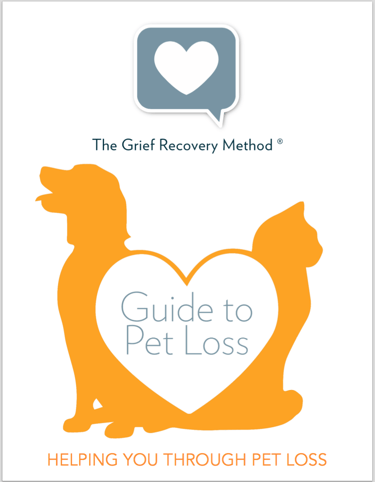eBook: Guide to Pet Loss
6 min read


Losing your pet is painful.
Grief is normal and natural, but society has taught you that it is not acceptable to feel sad. Most people consider their pet a part of the family, so losing your pet can be traumatic. Because we live in a “feel good” society, we are raised with misinformation about how to recover from pet loss.
If you’ve tried to feel better, but still feel heartbroken and alone, there is nothing wrong with you. It’s simply a matter of using the wrong tools. This eBook gives you the right tools to start on the path to recovery from the devastating loss of your pet.
WHAT IS GRIEF?
• Grief is the normal and natural reaction to loss, including the loss of your pet.
• Grief is commonly associated with the death of a person, but there are over 40 other types of loss, including the loss of a pet.
• Grief is the conflicting feelings caused by the end of, or change in, a familiar pattern or habit. For example, if you walk your dog every night at 5:00 pm you probably miss that time together but might also be relieved you no longer have to rush home to walk him every night.
• Grief is the feeling of reaching out for your pet that has always been there only to find that when you need him again he is no longer there. This is especially true for companion pets that afforded you love and friendship.
WHY AM I HAVING SUCH A HARD TIME?
Are you shocked at the intensity of your heartache?
You are not alone.
Humans have very unique relationships with their pets. Pets love you unconditionally. They provide company, joy and affection. They help you relax, offer comfort when you’re lonely, and help you get exercise! They love you when you’re in a good mood and when you’re in a bad mood.
Owning a pet enhances your life, so it makes sense that you’d be sad when you lose this special companion. They are part of your family.
COMMON RESPONSES TO LOSING YOUR PET
• Hard time concentrating
• Feeling numb
• Sleeping too much or not sleeping enough
• Hopelessness
• Looking around for your pet before realizing he is gone
• Overeating or losing your appetite
• Waves of emotion
No two people grieve exactly the same, but these reactions are common for many grievers going through pet loss.
HOW TO KNOW IF YOU ARE GRIEVING THE LOSS OF YOUR PET
• Do you avoid thinking about your pet?
• Do you change the subject when people ask about your pet?
• Do you talk for hours about your pet to anyone who will listen?
• Do fond memories about your pet turn painful?
• Do you only remember good things about your pet?
• Do you only remember negative things about your pet?
• Are you afraid to get a new pet?
• Did you get a new pet, but find it difficult to show it the same kind of love as the one who died?
Unresolved grief is usually the cause of these feelings.
GRIEVING THE LOSS OF YOUR PET IS NORMAL AND NATURAL
Grief is usually mislabeled as ADHD, Depression, PTSD, and other pathological conditions.
Misdiagnoses means mistreatment.
Grief is not clinical depression, but the symptoms are similar.
Sometimes people who lose a pet are put on medication which could interfere with their ability to recover from their broken hearts.
A study of almost 9000 patients concluded that people diagnosed as clinically depressed are actually experiencing unresolved grief due to losses in their past, including pet loss.
THERE ARE NO STAGES OF GRIEF
What people commonly refer to as stages of grief are the stages a patient goes through upon hearing they have a terminal illness.
The concept of Stages of Grief came from Elizabeth Kubler Ross’ work, “On Death and Dying”. The stages are what a terminally ill patient goes through when they find out they are dying. Not what a griever experiences following a loss.
Grief is individual and unique. Although many people who lose a pet have similar emotional experiences there are no set stages which they all experience.
YOU ARE NOT ALONE
Over half the people in the United States own pets!
That’s over 162 million dogs, cats, fish, birds, reptiles, and other small animals.
Sadly the life expectancy of a pet is about 16 years, which means almost all pet owners will experience pet loss.
There are over 40 million pet losses around the world each year.
There are 14 million cases of pet loss in the United States alone.
On average, three people are affected by the loss of each pet.
MISINFORMATION YOU WERE TAUGHT ABOUT GRIEF
Time heals all wounds. If time heals all wounds, how much time does it take? Some people have waited over 10 years to feel better. Many people still miss their pets from childhood. Time doesn’t heal. It’s what you do within that time that does.
Grieve alone. Did people avoid you after your pet died? Did they quickly change the subject when you tried to talk about it? Did they later call you and say, “I wanted to call, but figured you wanted space”. This sends a clear message that you’re supposed to grieve alone, when most grievers simply want to be listened to with dignity and respect.
Don’t feel bad. After losing a pet it’s normal to feel bad. When someone tells you not to feel bad it puts you at odds with your nature.
Replace the loss. “This weekend we’ll get you a new dog” is one of the most common suggestions people hear after losing a pet. If you can’t replace a human, you can’t replace a pet.
MOVING PET LOSS FROM THE HEAD TO THE HEART
All of the misinformation about recovering from pet loss is well intentioned, but it’s intellectual. We grieve from our hearts, not our heads. For example, if you put your sick dog to sleep, you might feel happy that he is no longer suffering, but you might also miss how he greeted you when you walked through the door.
WHAT’S SO BAD ABOUT UNRESOLVED GRIEF?
Unresolved grief from pet loss limits your capacity for happiness in your relationships with people and other pets.
It doesn’t feel good.
It affects the quality of your life.
Unsolved grief causes you to alter your future choices out of fear of being hurt again.
For example: many people won’t get a pet after losing one because they don’t want their heart broken again. They might be protecting their heart, but they won’t feel the unconditional love of having another pet.
UNHELPFUL COMMENTS PEOPLE SAY
Did you know out of the 141 comments people hear following a pet loss only 19 are helpful?
Have you heard any of these unhelpful comments since losing your pet?
• You’ll feel better about your pet soon. It just takes time.
• I know how you feel. My pet died last year.
• You should be grateful you had your dog for so long.
• Your cat is in a better place.
• Don’t feel bad, your horse was sick, but now he’s no longer in pain.
• Look on the bright side, at least you had your dog for ten years.
• You can always get another pet.
• Why are you so sad? It wasn’t a person, it’s just a pet.
HELPFUL WAYS TO EXPRESS YOUR GRIEF
Speak with your heart not your head.
Go easy on yourself. Express your emotions without judgment, criticism, or analysis.
Reach out for help even when you feel isolated.
Remember that every relationship is unique, so every griever is unique. What you are going through might be completely different from what your spouse is going through, even though you lost the same pet.
Never say “I know how you feel” Instead, try “I can’t imagine how you feel”.
WILL I EVER FEEL BETTER?
Grief Recovery means feeling better!
Recovery means you’ll be able to get a new pet and love it with your whole heart.
Recovery means you can choose not to get a new pet, and the decision won’t be based on fear of losing it.
Recovery means you will be able to have fond memories of your pet without having them turning painful.
Recovery means you might miss your pet sometimes, but you know it’s okay to talk about your feelings.
Recovery means feeling better without being afraid you will forget your pet.
Recovery means gaining new skills that you should have been taught as a child and using those skills to deal with your loss.
The Grief Recovery Method will give you the tools to recover from the loss of your pet, so you are able to make the legitimate choice of getting a new pet and be able to devote your heart to the new pet and its unique persona.
Time doesn’t heal, actions do. So, the question is not how much time should pass, but what work you have done to become emotionally complete with the pet that died.
WHEN CAN I GET A NEW PET?
You’ll recover from pet loss by making a series of small and correct choices.
Your first small and correct choice was reading this eBook.
Recovery from pet loss isn’t easy.
Taking the actions that lead to recovery will require being open-minded, willing and courageous.
If you’re ready to feel better, please contact me below.
____________
If you are suffering from grief from the loss of your beloved pet, please reach out today. I am here to answer any questions you may have about The Grief Recovery Handbook for Pet Loss. Let's decide together if my 6-session program is right for you. I am here to help you live a more joyful, peaceful life.
Contact me at 615-905-6565 or email me at andrea@yourgriefsolution.com, you can also leave a private message in the contact section.
Contacts
andrea@yourgriefsolution.com
615.905.6565
